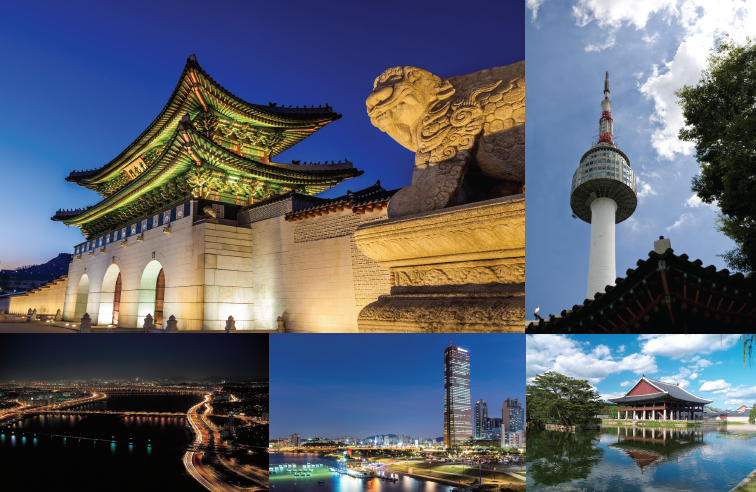Useful Information
Rich natural beauty combined with a unique historical and cultural heritage makes Korea a delightful place of discovery for international travelers. Despite the nation's rapid modernization, Koreans still adhere to their traditional values, such as the age-old Confucian respect for their elders.
The Korean Peninsula extends northeastern part of the Asian continent. The Peninsula shares its northern border with China and Russia. To its east is the East Sea, beyond which neighboring Japan lies. In addition to the mainland peninsula, Korea includes some 3,000 islands.
Seoul is the capital of Korea. The word 'Seoul' means capital in traditional Korean. Seoul is a city in which the Han River flows through, from east to west, and is surrounded by great mountains, and the city contains history and tradition, as well as the latest IT technology, making it a kind of a city which is quite rare anywhere on the globe.

INVITATION LETTER
Upon request, ISAAR & ICIC 2017 Secretariat will be happy to issue an official letter of invitation to attend the symposium. Letters of invitation are intended to help participants in raising travel funds, obtaining visa or permission from their institutions to attend the symposium and this does not include or imply payment by ISAAR & ICIC 2017 organizing Committee.
CURRENCY EXCHANGE
The unit of Korean currency is the Won (₩). One US dollar is equivalent to about ₩1,063 as of June, 2016.
Time Zone
The time zone is Greenwich Mean Time +9 hours.
BUSINESS HOURS
Government office hours are from 09:00 to 18:00, although from November through February they close at 17:00. Most private businesses open at anywhere from 08:30 to 10:00 and close in the evening. Banking business hours, however, are from 09:00 to 16:00 on weekdays.
CLIMATE
Korea has four distinct seasons - spring, summer, autumn and winter.
The autumn season in Korea is between September and November. The weather is cool and crisp, and the sky is particularly blue and clear, so it is great for outings and the harvest season makes for plenty of food to eat. Temperatures range from low of 20˚C to high of 25˚C in September.
1330 KOREA TRAVEL PHONE
For English assistance or travel information, just dial 1330, and a bilingual operator will offer you detailed tourism information.
ELECTRICAL SYSTEM
Outlets for 220 volts 60 cycle are dominant. Always check the power supply before using you equipment.
TELEPHONE CALLS
Local call costs ₩70 for three minutes. To make an international call, first dial the international dialing code(001, 002, 005, 006, 008), then the country code, area code, and finally the individual number. You may rent a cell phone at the airport.
TAX & TIPPING
Tipping is not a regular practice in Korea. Service charges are included in your bill for rooms, meals and other services at hotels and upscale restaurants.
Koreans occasionally do tip when they are especially pleased with the service they receive.
Value-Added Tax (VAT) is levied on most goods and services at a standard rate of 10% and is included in the retail price. In tourist hotels, this 10% tax applies to rooms, meals and other services and is included in the bill.
CREDIT CARDS
There will be no problem in using your credit card in Korea where American Express, Diners Club, Visa, Master Card, and JCB are widely accepted.
FOR TRAVEL INFORMATION
Korea National Tourism Organization (KNTO) help your stay in Korea more enjoyable. For travel information, visit (www.tour2korea.com). There is everything about Korea, things to do, festivals and events and much more. In order to learn more about Busan, visit (www.bto.or.kr).
